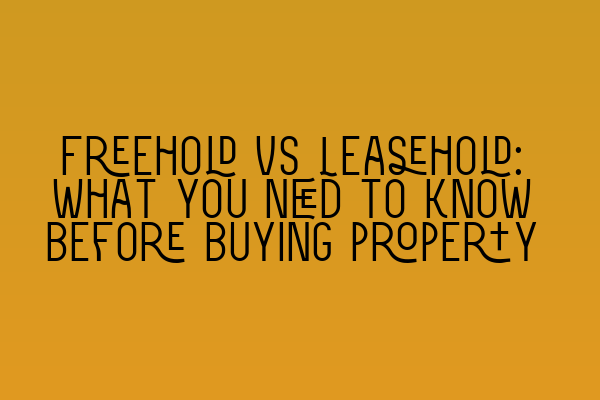Freehold vs Leasehold: What You Need to Know Before Buying Property
When it comes to buying a property, understanding the difference between freehold and leasehold is crucial. These terms relate to the type of ownership you will have over your new home, and they can have a significant impact on your rights and responsibilities as a homeowner. In this blog post, we will take an in-depth look at freehold and leasehold, discussing their characteristics, advantages, and potential drawbacks, so that you can make an informed decision when purchasing your new property.
What is Freehold?
Simply put, freehold ownership grants you complete ownership of both the property and the land it stands on. When you own a freehold property, you have full control and are not subject to any time restrictions or leasing agreements. This means you will have the freedom to make modifications and changes to the property as you see fit, without seeking permission from anyone else. You will also be solely responsible for the maintenance and repair costs associated with the property.
Advantages of Freehold:
1. Ownership: Freehold ownership provides the highest level of ownership and control over the property, allowing you to make any alterations or extensions without requiring consent from anyone else.
2. Investment: Freehold properties often have higher market values and are considered better long-term investments due to the lack of lease restrictions.
3. No Ground Rent: Unlike leasehold properties, freehold properties do not require you to pay ground rent, which can save you money in the long run.
4. Peace of Mind: With freehold ownership, you won’t have to worry about your lease expiring or facing any lease renewal negotiations.
What is Leasehold?
Leasehold ownership, on the other hand, means that you own the property for a fixed period of time, as specified in the lease agreement. This fixed period can range from a few decades to hundreds of years, depending on the terms of the lease. In a leasehold arrangement, the land on which the property is located is typically owned by a separate entity, known as the freeholder or landlord. As a leaseholder, you will usually be required to pay ground rent to the freeholder, along with other charges such as service charges and maintenance fees.
Advantages of Leasehold:
1. Affordability: Leasehold properties are often more affordable than freehold properties, making them an attractive option for first-time buyers or those on a budget.
2. Shared Responsibility: In a leasehold arrangement, the freeholder or management company is responsible for the maintenance and repair of the shared areas and any communal facilities, relieving you of some maintenance responsibilities.
3. Amenities: Leasehold properties, particularly those in larger developments, often come with additional amenities such as gyms, swimming pools, and communal gardens, which can enhance your living experience.
4. Community: Living in a leasehold property often means being part of a community, as you will have neighbors who share the same building or estate. This can provide a sense of security and social interaction.
Considerations When Choosing Between Freehold and Leasehold:
1. Length of Lease: If you are considering a leasehold property, it is important to check the length of the lease. The remaining duration will impact the property’s value and your ability to obtain future financing or sell the property.
2. Ground Rent and Service Charges: Before committing to a leasehold property, thoroughly review the terms of the lease, including any ground rent or service charges. These costs can have a significant financial impact over the long term.
3. Lease Extensions and Renewals: If you are purchasing a leasehold property, find out the options for extending the lease or negotiating a lease renewal. This is crucial for protecting the value of your investment.
4. Restrictions and Permissions: Leasehold properties often come with various restrictions, such as restrictions on pet ownership or making alterations to the property. Make sure you are aware of these restrictions and understand their implications.
In conclusion, the choice between freehold and leasehold depends on your individual circumstances, budget, and long-term plans. Freehold ownership offers complete control and ownership, but it comes with more responsibilities and potentially higher upfront costs. Leasehold ownership provides more affordability and shared responsibilities, but there are lease restrictions and ongoing costs to consider. Ultimately, it is important to thoroughly research and consult with a property law expert before making a decision and proceeding with a property purchase.
At SQE Property Law & Land Law, our team of legal experts can assist you in navigating the complexities of property ownership and help you make the right choice based on your unique situation. Contact us today for professional advice and guidance to ensure a smooth and informed property buying experience.
